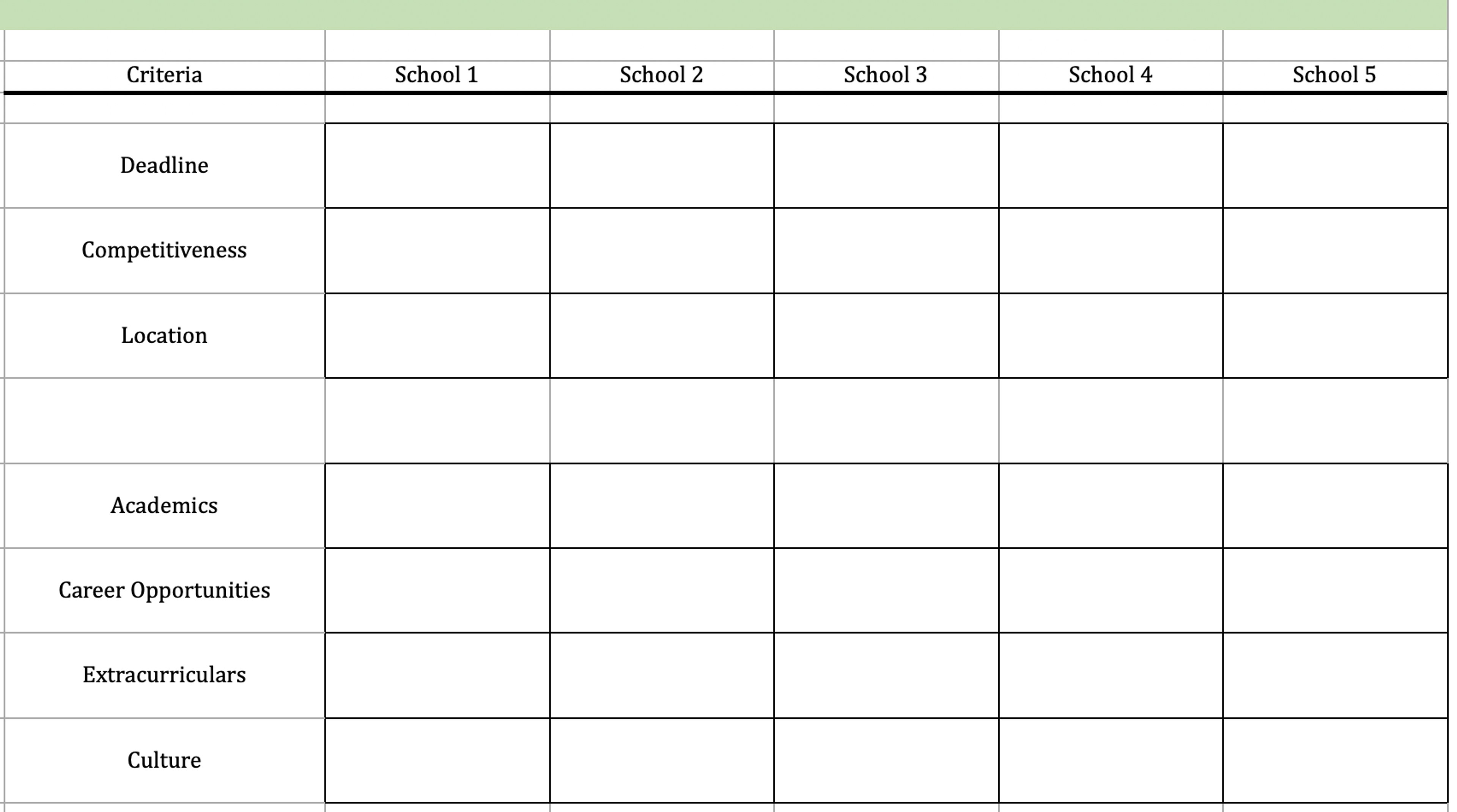
Join a free event
Learn from top coaches and industry experts in live, interactive sessions you can join for free.
Table of Contents
So you’ve decided to apply to business school. Congratulations!
Now comes one of the most important steps in your higher education journey: choosing the right MBA program.
It can be tempting to look at MBA rankings and simply apply to the top ten programs, but finding a program that truly fits your career goals, learning style, and personal preferences is essential. Applying to business schools is a lengthy, competitive, and often expensive process, so you should only invest in programs that genuinely interest you.
Remember, you’re not just applying for admission. You are choosing where you’ll spend two transformative years of your life. Taking the time to do your research, create a well-rounded school list, and apply strategically will pay significant dividends in the long run.
Assess Your MBA Candidacy
Before you start comparing programs, take an honest look at yourself as an MBA applicant. Every year, business schools review thousands of applications from talented professionals. To maximize your chances, you need to understand your own strengths and how you stack up against other MBA candidates.
Here are four major areas to evaluate:
Professional Experience
Your professional background is one of the strongest components of your MBA application. Admissions committees value career progression, leadership potential, and demonstrated impact, which together reflect your readiness to thrive in rigorous business environments. Think about how you’ve grown in your career, whether through managing people, projects, or budgets, and what measurable results you can point to that showcase your success.
Most MBA programs require students to have around four to five years of work experience, though many schools also accept exceptional early-career applicants. Committees seek professionals from diverse industries and geographies who can contribute fresh perspectives to the class and enrich the overall student experience.
Academic Background
Admissions officers, of course, are also looking for candidates with impressive academic backgrounds and credentials. This doesn't necessarily mean a 4.0 GPA and a perfect score on the GMAT or GRE, though these things certainly help. (Note also that you might, for instance, offset a low undergraduate GPA with a strong GMAT score.)
Top business schools want to see evidence of academic rigor, i.e., did you take the most challenging coursework and do well in your core classes, as well as demonstrations of intellectual curiosity and vitality, i.e., did you participate in academically-themed clubs or organizations during or after college? Your GPA and scores, as well as the quality of your academic experience, all contribute to your MBA candidacy.
A great way to gauge your chances of success is to compare your statistics to those of the most recent entering class of your target programs. Aim for at least the average. If you’re below the average for one stat (low GPA, for instance), try to go above average in the other (high test score).
Leadership Accomplishments
Admissions committees are looking for future leaders and the surest predictor of future behavior is past behavior. Therefore, candidates with material leadership experience to their name, whether professional, personal, or otherwise, will have an advantage.
Did you take charge of a large mergers & acquisitions project for your consulting firm that resulted in a successful transaction? Did you manage your company's summer interns repeatedly? Did you collaborate with your professional peers to reduce your employer's carbon footprint or present important analytical dashboards to senior management?
Experiences like these, in sum, will make you a stronger MBA applicant. This is particularly important for deferred MBA applicants who have less work experience to their names, but can show leadership through clubs, internships, projects, entrepreneurial endeavors, and more.
Extracurriculars and Intangibles
Finally, extracurriculars and intangibles help flesh you out as a candidate and give some color to your otherwise black-and-white profile. Did you return to your old college campus for a series of lectures on a topic you're deeply passionate about? Did you help your local non-profit procure many academic scholarships that they wouldn't have earned without your help? Were you an active volunteer in your undergraduate alumni network, helping with fundraising and reunion planning?
Are you the first person in your family to go to college? Do you hail from an underrepresented background or industry? Do you have some unique experience that no other candidates will be able to speak about in their materials? These things can significantly boost your profile and make you a more fully realized applicant.
Of course, there are also the negative intangibles: honor code violations, marks on your criminal records, etc. These aren't deal-breakers per se, but they can make it harder to get into one of your top schools. Our advice for these is to transform your obstacles into stepping stones; explain how these experiences shaped your journey or how they helped you see something more clearly.
Once you've taken time to evaluate your own candidacy and how strong an applicant you'll be, it's time to dig into your school research.
For more information on extracurriculars, read this article: What Extracurriculars are Graduate Programs Looking For?
Identify Your Strengths and Areas for Growth
Once you’ve evaluated your professional, academic, and personal background, identify where you’re strongest and where you may need improvement. If your leadership record is impressive but your GPA is low, consider retaking the GMAT or highlighting quant-heavy coursework. Understanding your balance of strengths will help you target the right MBA programs for your profile.
How to Research Top MBA Programs
The next step in choosing an MBA program is doing your research. This is where you’ll start to see which programs align with your personality, career goals, and preferred learning environment.
1. Browse Official School Resources
Most business schools maintain detailed websites outlining their curriculum, courses, program length, faculty, and admissions process. With that, start visiting their website. All business schools have robust information about their respective programs online, including details about their curriculum, faculty, student life, application requirements, and what they're looking for in candidates. That's the first step. Once you've done that, follow up by browsing blogs, listening to podcasts, and following the social accounts of MBA graduates whose backgrounds match your own. This is a good way to get a feel for what each school has to offer, both from the school's perspective and from the perspective of its affiliates and alumni.
Read: The Top 25 MBA Programs—Acceptance Rates, Tuition, and More
Chat with Current Students and Alumni
To conduct even more in-depth research, reach out to current and past MBA students in your network and ask them if they'd be willing to chat about their business school experience. Most will.
In fact, if you have any lingering questions about how to choose the right MBA program, current students may be able to shed some light on what made them choose the school they’re at, while alumni can give a good frame of reference as to what the program did for them in terms of their career goals.
Make Campus Visits
Finally, if you're able, make visits to the schools you're most seriously considering. This is perhaps the best way to understand what attending that school would be like. Schedule visits when the school is actually in session, so you can attend a class if possible, and soak up the full on-campus experience.
Pro tip: Most of the experts on Leland hail from top MBA programs, and many are current students. If you're struggling to connect with current students or alumni in your own network, consider reaching out to a Leland coach and speaking with them, if only for an hour, about their application and enrollment experience. It's a small expense that could give you the information you need to say "yes" or "no" to a school. Click here for Leland's world-class MBA admissions coaches.
Turn Your Research Into a Shortlist
Once you’ve gathered insights, begin narrowing your choices. Compare each MBA program based on academics, location, competitiveness, cost, and alignment with your career aspirations. Create a spreadsheet to rank programs by:
- Curriculum fit (general MBA, finance, business analytics, or healthcare management)
- Location and cost of living
- Networking opportunities and alumni connections
- Total cost (tuition, living expenses, financial aid options)
This process will help you visualize where each school stands relative to your professional goals.
What Type of MBA Program Should You Apply To?
First and foremost, decide on what kind of programs you're going to target. If you've committed to a fully immersive experience and have the flexibility to move and live on a university campus, then a full-time MBA program is right for you.
Read: The Different Types of MBA Programs—and Which One is Right for You
Full-Time MBA Programs
Full-time MBA programs provide immersive learning, extensive networking opportunities, and access to a global alumni network. This traditional MBA format is ideal for students looking to pivot careers or build advanced management skills in a concentrated two-year setting.
Most full-time programs emphasize academic excellence, experiential learning, and hands-on internships that prepare students for leadership roles in dynamic business environments.
Part-Time MBA Programs
If you're advancing rapidly in your career and want to remain in your job but still want to earn your master's degree, then a part-time MBA might be the thing for you. These programs are designed to accommodate working professionals and usually offer evening or weekend classes. The best part about part-time programs? They allow you to apply what you learn in real time at your current job! It's a great option for those who need to balance work, studies, and personal life without taking a career break.
Interested in what a part-time program can offer you compared to other options? Read: The 25 Best Part-Time MBA Programs.
Executive MBA (EMBA) Programs
Alternatively, if you've racked up several years of experience at your current company, and that company is willing to sponsor you, you might consider looking into some executive MBA programs. These programs specifically cater to seasoned professionals who want to enhance their leadership skills and strategic thinking. They also often feature a cohort model to provide a network of peers with similar levels of experience. Compared to part-time programs, executive MBA programs are generally more careful about minimizing disruption to your professional commitments.
If you’re curious to learn more about Executive MBA programs and how they differ from others, read: What is an Executive MBA and How Is It Different From a Full-Time Program?
Online MBA Programs
Online programs have grown in popularity due to their accessibility and lower tuition costs. Many are accredited by Advance Collegiate Schools of Business (AACSB) and deliver a robust curriculum through asynchronous modules and live virtual sessions.
Online MBAs are ideal for self-motivated students who want to earn a degree from respected universities while balancing personal and professional responsibilities. These programs provide the same high-quality education and faculty access as traditional MBA options.
For more info, read: Everything to Know About Online MBA Programs.
How Many MBA Programs Should You Apply To?
There’s no perfect number, but quality beats quantity. The application process takes time and effort, so apply only to schools where you’d be genuinely excited to enroll.
If your schedule allows, consider applying to 6–8 programs, divided among:
- 2–3 Reach Schools: Highly competitive programs
- 4–5 Target Schools: Institutions where your qualifications align closely with class averages
- 2–3 Safety Schools: Programs where you exceed the average applicant profile
Also consider the total cost of applications, travel, and living expenses. Some schools offer financial aid or fee waivers, so plan your budget accordingly.
Which MBA Programs Should I Apply To?
Okay! Now we've arrived at the heart of the matter: which schools will you apply to? We’ve listed out some factors to keep in mind when you start to narrow down your list. Below, we've laid out the primary criteria you should consider when making your decision.
1. Deadline
First, research school deadlines. As mentioned, most business schools invite applicants to apply in three rounds, and submission dates are clustered together: Round 1 in September/October, Round 2 in January, and Round 3 in April. There are a few key exceptions, though, for instance, Harvard Business School no longer accepts Round 3 applications, and you’ll want to plan accordingly. You may have big life events you need to take into account, like weddings, children, or a promotion at work, so start your decision-making process by simply figuring out when applications are due and if you'll be able to meet those deadlines.
2. Competitiveness
Next, find out how competitive your target schools are. Interview and acceptance rates for most programs are readily available (you may even have compiled these during your school research). Cast a wide net, and maximize your odds of earning at least one acceptance letter. We recommend applying to a mix of safety, target, and reach schools to balance your chances.
3. Location
As a final basic metric, take note of a school’s location. You probably know that Harvard Business School is in Massachusetts and that Columbia Business School is in New York City, but give some thought to the fact that you’ll be living in that city for two or more years. (If you don’t like cold weather, those northeast winters might be a good reason to cross HBS and Columbia off your list!)
4. Academics
Once you’ve nailed the basics for your schools, research the actual experience of going there, starting with academics. Go through the notes you've compiled about the school's academic offerings, determine how important the in-classroom experience is to you, and rank your MBA programs accordingly.
Pro tip: While you’re on this step, write down the names of a few specific classes that you’d like to study (and the professors who teach them). Almost all schools ask you to write a statement or essay about why their school, in particular, excites you, and that’s a great place to show off the detailed research you’ve done about their course offerings.
Read: What Do You Actually Learn in Business School?
5. Career Opportunities
Next, think about how each school will set you up for success in reaching your career goals. Each program has a particular lean or thing they’re known for, which affects the companies that recruit there. Wharton, for instance, is highly regarded for its finance curriculum and might be a good choice if you’re certain that financial management is the industry you want to end up in, whereas the Yale School of Management offers excellent opportunities for those considering careers in social impact and nonprofit industries. Prospective students should know the strengths and weaknesses of their target schools. Not only will this help you apply to the right ones, but also give you good content for your essays, interviews, and other application materials.
6. Extracurriculars
A quick scan of each school’s website will also give you a feel for what kind of clubs, activities, conferences, incubators, and leadership opportunities it offers. While you might be most concerned with academics and career prospects, don’t overlook these. They go a long way toward giving you a full, well-rounded MBA program experience. Pro tip: As with academics, while you’re here, write down the names of a few clubs and leadership opportunities you’d like to participate in. Including these in your application materials lets a school know that you’re serious about them.
7. Culture
Finally, dig around and get a sense of the flavor of each school. Yes, this is intangible, but it matters: both for your experience at the school and for how you put your application together. Harvard Business School is well-known for its structured training in general management, whereas Stanford’s Graduate School of Business places more of a premium on entrepreneurship and motivational leadership. Connecting with MBA graduates is a great way to assess a school’s culture.
Pro tip: There are dozens of world-class coaches on Leland who are happy to chat about their experiences. If you’re interested in applying to, say, Berkeley Haas, but don’t know anyone who attended, we suggest booking an hour with a Haas alum and picking their brain. Speaking to someone with experience is an excellent resource to use to ensure you choose the right MBA program for you.
Compare the Total Cost and Student Experience
Before hitting submit, take a holistic view of your shortlist. Compare the total cost, including tuition, fees, and living expenses, against career outcomes and ROI.
Beyond finances, think about the student experience: How collaborative is the culture? How strong is the alumni network? Are there international trips, special events, or mentorship programs? The best MBA programs balance academic rigor with personal growth and student well-being.
Make Your List
Now you’re finally ready to put together your list! As we discussed earlier, assessing your candidacy is a crucial first step for prospective students and is especially handy when picking your Target, Reach, and Safety schools.
To help you keep track of all your criteria and all of your schools, we put together this helpful School Selection Spreadsheet. It has our recommended criteria pre-populated, so you can compare all of your prospective schools, but of course, feel free to make your own tweaks. To fill it out, simply enter in the relevant information from your research, so you have it handy in one place.


MBA Program Research & Selection Sheet
Pro tip: As you fill it out, you may also assign your own rankings to the different categories, so you can begin your selection process.
The Bottom Line
Keep in mind that even though it may seem obvious, it’s important to keep in mind that prospective MBA students who have done more research on their potential schools are generally better equipped to write stellar applications. Thorough research not only helps you tailor your applications to each program's strengths but also demonstrates your genuine interest and commitment to admissions committees. Moreover, doing so ensures you make informed decisions about where you'll spend the next couple of years of your life. That being said, take the time to research, write down, and be honest with yourself about which programs interest you the most!
Tired Of Asking Yourself, "Which MBA Program Is Right For Me?"
If you’re feeling overwhelmed or unsure about how to evaluate schools or position yourself in your applications, don’t go it alone. A great MBA coach can help you clarify your goals, identify programs that truly align with your background, and craft an application that reflects your best self. Browse Top MBA coaches to get personalized support every step of the way.
Here are some other articles/resources you may find helpful:
- What is an MBA Degree? An Expert Guide
- The Different Types of MBA Programs—and Which One is Right for You
- MBA vs. MPA: How to Decide Which One is Right For You
- MBA Requirements: What You Need to Apply (and What Top Programs Really Look For)
- Is an MBA Worth It? Pros and Cons and How to Decide
- T25 MBA Acceptance Rates, GPA, & Test Scores
FAQs
How do I know which MBA suits me?
- To find which MBA program is right for you, start by defining your career goals and preferred learning format. Prospective students should assess whether they want an immersive full-time experience or a flexible online or part-time degree. Research each university’s curriculum, alumni network, and focus areas to ensure the program supports your business ambitions.
How to decide if an MBA is right for you?
- An MBA is ideal if you want to advance your business career, switch industries, or build leadership skills. It’s a valuable education investment that helps graduates gain strategic insight, professional credibility, and global networks beyond graduation. Consider your goals, finances, and readiness to pursue a rigorous degree program.
How to choose a good MBA program?
- A good MBA program aligns with your professional goals, preferred university, and desired education experience. Look for accredited business schools with strong faculty, global networks, and proven career outcomes. Connect with alumni and prosp students to learn how the degree supports success after graduation.
What MBA is most in demand?
- The most in-demand MBAs today include business analytics, finance, technology, and healthcare management. These specializations prepare graduates to lead in evolving business environments while maintaining flexibility to pursue new opportunities after graduation. Choose a university program that aligns with your skills and long-term education goals.
Browse hundreds of expert coaches
Leland coaches have helped thousands of people achieve their goals. A dedicated mentor can make all the difference.


























